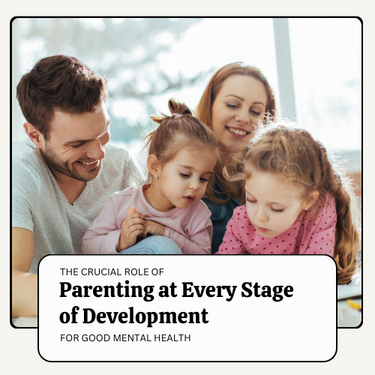
Parents are becoming more focused on helping their kids understand and manage their feelings, and teaching them how to handle life's ups and downs.
Why?
Because research continuously shows that that how we raise our kids and the experiences they have early in life can have a big impact on their mental health later on.
Technology has also changed the way we parent. We have easy access to information and support online, which can be really helpful when we need advice or just want to connect with other parents going through similar things.
People are also more open to talking about mental health now. It's not as taboo as it used to be, and parents are more willing to get help for themselves and their kids when they need it.
In this changing world, being a parent means always learning and growing. We're all doing our best to create a loving and supportive environment for our kids, and that's what really matters in the end.
And yet, too many statistics show that kids are really struggling with mental health issues. They need their parents to support their mental wellness through various stages of development, starting from infancy through the teen years and young adulthood.
During infancy, babies rely on caregivers for everything, including emotional support. Responsive caregiving, nurturing touch, and consistent routines lay the foundation for healthy attachment and emotional regulation. According to the World Health Organization, approximately 15% of infants experience mental health difficulties related to maternal depression, caregiver stress, or neglect. Recognizing and addressing these challenges early is crucial for promoting healthy development.
Toddlers are navigating a world of big emotions with limited language skills. Parents can support their emotional development by validating feelings, offering comfort during distress, and teaching simple coping strategies like taking deep breaths or hugging a favorite toy. Research suggests that around 10-20% of toddlers experience behavioral or emotional difficulties, highlighting the importance of early intervention and supportive parenting practices.
Preschoolers are developing social skills, empathy, and resilience. Parents can encourage positive social interactions, teach problem-solving skills, and provide opportunities for independent exploration. Studies show that at least 8% to 10% of children younger than 5 years experience clinically significant and impairing mental health problems, which include emotional, behavioral, and social relationship problems, emphasizing the need for supportive environments both at home and in early childhood settings.
As children enter school, they face new challenges academically and socially. Parents can promote mental wellness by fostering a supportive home environment, encouraging open communication, and providing opportunities for extracurricular activities and friendships. According to the Center for Disease Control (CDC):
And things are not getting better. From March 2020 to October 2020, mental health–related emergency department visits increased 24% for children ages 5 to 11. These statistics underscore the importance of early detection and access to appropriate interventions.
Tweens are navigating the complexities of identity formation, peer relationships, and academic pressures. Parents can support their mental health by maintaining open dialogue, setting realistic expectations, and promoting healthy coping mechanisms. Studies indicate that from 2008 to 2020, the rates of death from suicide among people age 12 and over increased 16% overall, highlighting the need for parental support and access to mental health resources.
Adolescence is a time of significant change, with teenagers seeking autonomy while still relying on parental guidance. Parents can support their teen's mental wellness by fostering independence, encouraging self-care practices, and addressing any emerging mental health concerns with compassion and understanding. Research shows that approximately 1 in 5 teenagers experience a mental health disorder,making it essential for parents to prioritize open communication and access to mental health resources.
As young adults prepare for college or other life transitions, parents play a crucial role in providing emotional support, teaching life skills, and encouraging self-advocacy. It's essential to discuss mental health openly and ensure access to support services on college campuses. Due to the high prevalence of mental health disorders among college students in recent studies, there is a tremendous need for ongoing support during this transitional period.
Supporting our children's mental health and wellness is a lifelong journey that begins in infancy and continues through adulthood. By understanding the unique challenges and milestones at each stage of development, parents can provide the guidance, support, and resources necessary to nurture their child's mental well-being and promote resilience for years to come. Remember, you're not alone on this journey, and there are resources and professionals available to support you and your child every step of the way.

Sign up for our newsletter to get instant access to parenting resources sent directly in your inbox!
